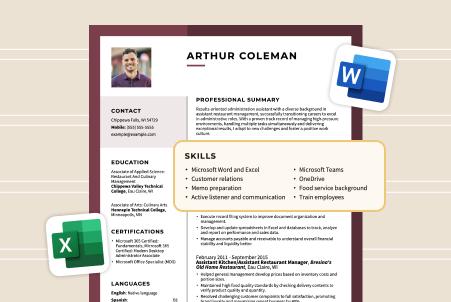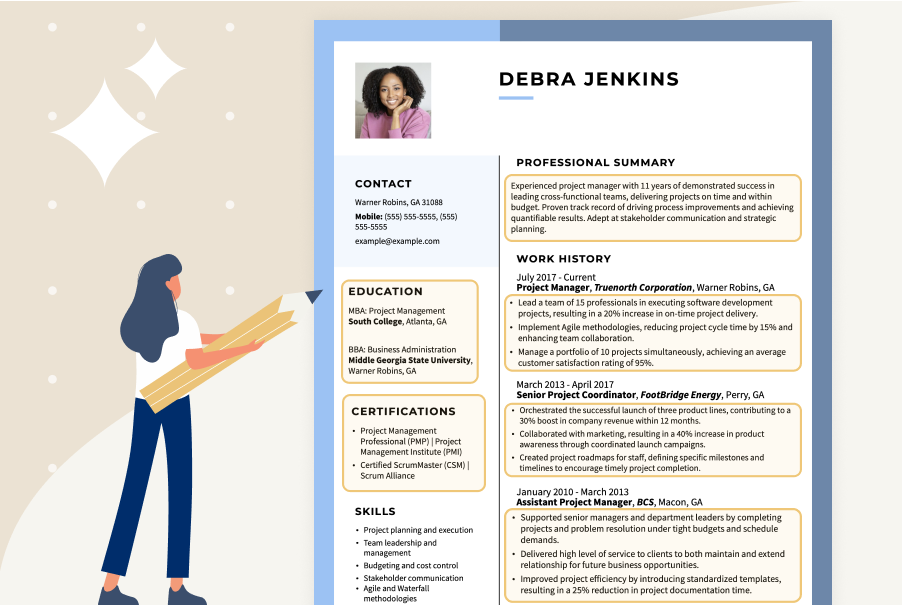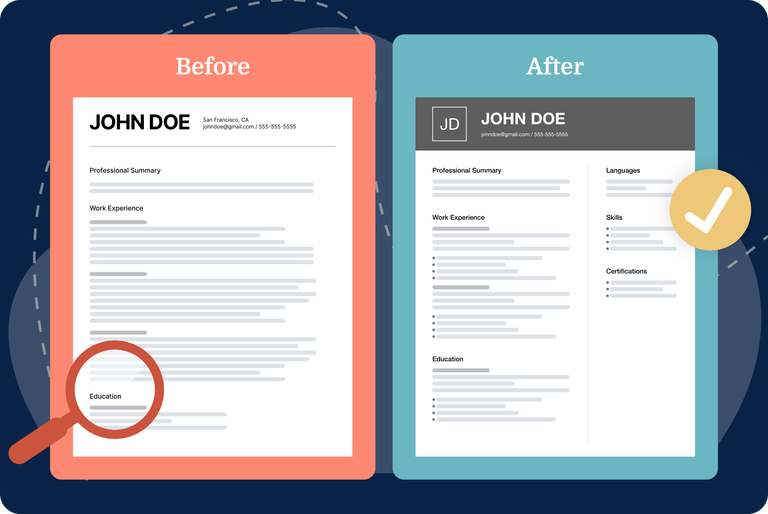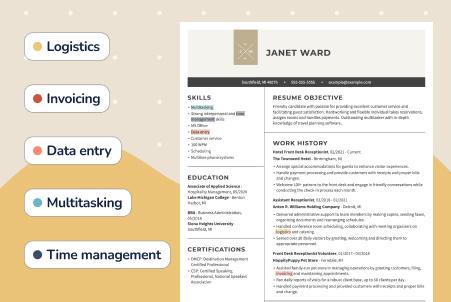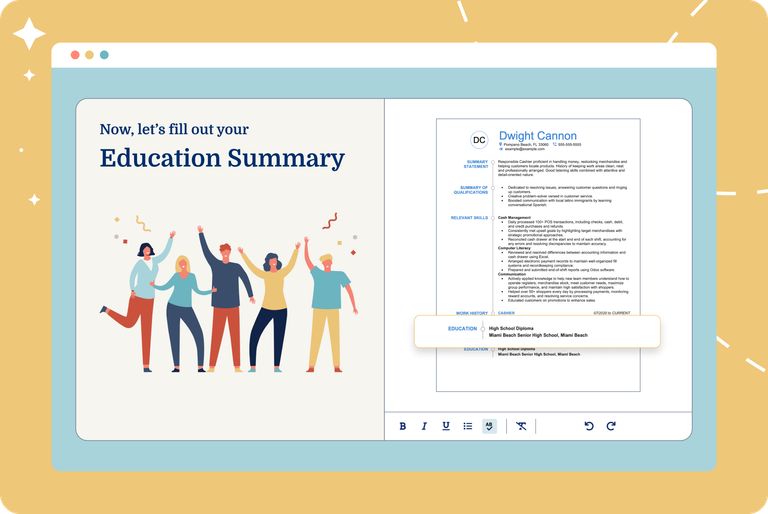Administrative Skills: Examples & Tips For Your Resume

Our customers have been hired at: *Foot Note
As the backbone of efficient office operations, administrative work includes many tasks essential for organizational success. From managing schedules and coordinating meetings to handling correspondence and maintaining records, administrative professionals play a pivotal role in ensuring seamless workflow and productivity within the workplace. In this guide, you’ll learn the top administrative skills to add to your resume and how to develop them to advance your career. Read our guide on how to write a resume to learn how to display your administrative skills effectively.
What are administrative skills?
More administrative resume examples
- Administrative Resume Examples & Templates
- Administrative Assistant Resume Example & Templates
- Administrative Front Desk Clerk Resume Examples & Templates
- Administrative Assistant Cover Letter Examples & Templates
- Administrative Job CV Examples & Templates
Use a resume template to ensure you demonstrate your administrative skills professionally and effectively on your resume.
Examples of administrative skills
We’ve curated a list of various skills used for administrative tasks to emphasize on your resume. Highlight any of the skills below if they pertain to you and match the responsibilities of the job description.
Hard skills
Administrative tasks often require specific, measurable abilities and knowledge that can be honed through learning and practice. These hard skills are essential for ensuring streamlined processes within an organization.
Examples of hard administrative skills include:
- Office management
- Data entry and management
- Scheduling and calendar management
- Record-keeping and documentation
- Project coordination and tracking
- Budgeting and financial management
- Resource allocation and procurement
- Report generation and analysis
- Database management
- Technical proficiency
Soft skills
Soft skills are vital to administrative work because they facilitate effective communication, relationship building and task management.
Here are 10 essential soft administrative skills:
- Ability to work independently
- Time management
- Adaptability
- Problem-solving
- Attention to detail
- Customer service
- Teamwork
- Organization
- Presentation
- Planning
Transferable skills
Transferable skills are invaluable in administrative roles because they can be applied across various industries and enable professionals to adapt to diverse environments and challenges.
Here are ten crucial transferable administrative skills:
- Ethics
- Organization
- Decision making
- Written and verbal communication
- Creativity
- Critical thinking
- Flexibility
- Active listening
- Stress management
- Leadership
Computer skills
Computer skills are crucial to administrative jobs because they enable professionals to efficiently utilize software programs for data management, communication and task organization. Proficiency in computer skills ensures that administrative tasks are executed accurately and expediently in today's digital work environment.
- Proficiency in Microsoft Office Suite (Word, Excel, PowerPoint, Outlook)
- Data entry and management skills
- Familiarity with office software and tools (e.g., Google Workspace, Adobe Acrobat)
- Typing speed and accuracy
- Database management (e.g., SQL, Access)
- Email management and etiquette
- Internet research skills
- File organization and cloud storage management
- Spreadsheet creation and analysis (e.g., formulas, charts)
- Presentation design and delivery skills
Make a resume with MyPerfectResume
Our Resume builder can help you write the perfect resume. Start Now!
Improve your administrative skills
Improving administrative skills is a continual process involving self-awareness and intention. One practical approach is identifying areas for enhancement based on your strengths and weaknesses. This might involve honing your technical proficiency, such as mastering advanced office software features or learning new tools to streamline tasks. Cultivating soft skills such as communication, time management and problem-solving can significantly boost administrative effectiveness.
Consider the following strategies and tactics to improve your administrative skills:
Prioritize your tasks: Use techniques like Eisenhower's Matrix to prioritize tasks based on their urgency and importance, ensuring that you focus on high-impact activities first.
Master time management: Try productivity tools like calendars, planners and task lists to organize your schedule effectively. Set aside specific time blocks for different tasks and avoid multitasking to maximize productivity.
Develop organizational systems: Implement efficient filing and information management systems to ensure easy access to essential documents and data. Keep your workspace organized to minimize clutter and improve efficiency.
Delegate responsibilities: Learn to delegate tasks to others when appropriate. Trust your team members with responsibilities and empower them to take ownership of their work, freeing up time for you to focus on higher-level tasks.
Stay tech-savvy: Embrace technology to streamline administrative processes. Explore productivity tools, project management software and automation solutions to simplify scheduling, data entry and document management tasks.
Keep learning: Attend workshops, webinars and conferences and pursue certifications to stay updated on industry trends, best practices and new technologies relevant to administration.
How to highlight administrative skills on your resume
When writing a resume for an administrative job, it is essential to highlight job-relevant administrative skills to stand out in today’s competitive job market.
Here are some key strategies to ensure your administrative abilities shine on your resume:
- Start with a clean, professional resume format that aligns with your experience and career goals.
- Pick a resume template that clearly and professionally showcases your administrative skills.
- In your work history section, display examples of projects you contributed to and how you used your administrative skills to make them successful.
- Highlight two to five pertinent administrative skills in your resume summary.
- Create a dedicated section on your resume to highlight your skills. Create a category to emphasize your top five most relevant skills within that section. Use bullet points for clarity.
Common tools and technologies used by administrative professionals
Administrative professionals commonly use various tools and technologies, such as scheduling software, document management tools and communication platforms, to manage tasks efficiently, streamline workflows, improve organization, and enhance productivity.
Some standard tools and technologies used by administrative workers include:
- Microsoft Office Suite (e.g., Word, Excel, Outlook)
- Google Workspace (e.g., Google Docs, Sheets, Gmail)
- Project management software (e.g., Trello, Asana)
- Communication platforms (e.g., Slack, Microsoft Teams)
- Document management systems (e.g., Dropbox, OneDrive)
- Calendar management tools: (e.g., Calendly, Fantastical, Microsoft Outlook)
- Time management software: (e.g., RescueTime, Toggl, Clockify)
Best administrative certifications
Certifications in administration can enhance your administration skills, increase your job opportunities and eventually lead to promotions or higher pay.
Here are five valuable certifications for administrative professionals:
- Certified Administrative Professional (CAP)
- Microsoft Office Specialist (MOS)
- Project Management Professional (PMP)
- Certified Professional Secretary (CPS)
- QuickBooks Certification
Key takeaways
- Highlighting diverse administrative skills can enhance your job prospects and effectiveness in the workplace.
- Key strategies for adding administrative skills to your resume include tailoring your resume to the job description, using a resume format based on your goals and experience, and listing relevant administrative skills and achievements that make candidates stand out.
- Administrative professionals use various tools such as scheduling software, document management systems and communication platforms.
- Ongoing skill improvement through learning new software, attending workshops and earning certifications (e.g., CAP, MOS) is vital to administrative career advancement.
FAQ
Why is administrative work significant in office operations?
Administrative work is crucial for maintaining efficient office operations and involves handling tasks such as scheduling, correspondence, record-keeping and coordination, which are essential for an organization’s smooth functioning.
What industries have a high demand for administrative roles?
Administrative skills are sought across various industries, including healthcare, finance, education, government and technology, highlighting their universal importance in business operations.
How do I add administrative skills to my cover letter?
To effectively incorporate administrative skills into your cover letter, identify the specific skills highlighted in the job description that align with your experience. Begin your cover letter with a strong opening mentioning your proficiency in critical administrative tasks such as office management, scheduling, or data entry.
Support these claims by providing examples from previous roles where you successfully applied these skills to achieve positive outcomes. Conclude by emphasizing your enthusiasm for the opportunity and how your administrative expertise will contribute to the organization’s success.
How can mastering administrative skills contribute to career growth?
Mastering administrative skills ensures success in current roles and opens doors to new opportunities and career advancement. Professionals with strong administrative skills are often sought for leadership positions and can pivot into various industries.
What specific tasks fall under administrative work?
Administrative work encompasses a wide range of tasks, including but not limited to scheduling appointments, managing correspondence, organizing files, maintaining databases, coordinating meetings and handling office logistics.
How can administrative professionals stay updated with evolving technologies?
Administrative professionals can stay current with evolving technologies by regularly participating in training programs, attending webinars and workshops, joining professional associations, and leveraging online resources and forums for knowledge sharing.
What are some common administrative job interview questions?
Common job interview questions for administrative jobs include:
- Can you describe your experience with office management tasks?
- How do you prioritize tasks and manage multiple deadlines?
- How do you handle sensitive or confidential information?
- Can you give an example of a time when you resolved a challenging situation in the workplace?
- What computer software and tools are you proficient in for administrative tasks?
See also: HR Administrative Assistant Interview Questions and Answers
Our customers have been hired at:*Foot Note
